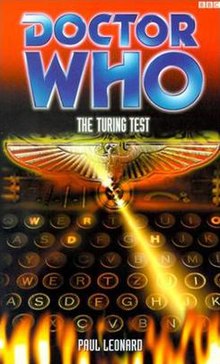BASIC PLOT
Alan Turing, the Second World War's critical code-breaker, is called in to break a mysterious new cypher. But his new friend, the Doctor, knows far too much about the code. To find out the truth, the Doctor must cross the front line and travel through occupied Germany - into the firing line of the bloodiest war in history.
DOCTOR
Eighth.
COMPANIONS
None.
MATERIALISATION CIRCUIT
None. The still-not-fully-formed cuboid is seen in the Doctor's rooms at Bletchley, December 1944 (pg 19) although it's later moved elsewhere (pg 22).
PREPARATORY READING
None.
CONTINUITY REFERENCES
Pg 20 "Still radiating a manic enthusiasm, he clambered up on the wardrobe door, using the panelling for footholds, and extracted a curious shaped key from somewhere near the top." The Doctor also kept a key on top of the TARDIS in the Telemovie, although at this point there's no "P" on the blue cuboid.
Pg 41 "That man Elgar reminds me of someone." Presumably the Brigadier, especially because Turing compares Elgar to the steroetypical Colonel Blimp. But see Continuity cock-Ups.
"I'm older than you are, you Limey ponce." This may be a deliberate reference to Withnail and I, where Paul McGann's character was also called a ponce. Or it may not.
Pg 59 "Only twice in the last fifty years have I felt the way I should feel -" The Burning and Casualties of War.
Pg 143 "He scribbled something on one of the sheets of paper, left-handed. [...] He made another note on the code sheets, this time with his right hand." The Doctor also wrote with both hands in The Curse of Fenric.
Pg 144 "I noticed there was a clock in the room, elaborate ormolu, ticking quietly. It looked original, and expensive. Surely it wasn't a standard hotel fitting." The Edge of Destruction. Presumably the Doctor carries an ormolu clock with him out of an unconscious desire to return to his beloved time machine. Let's hope he also doesn't go crazy with scissors on regular occasions.
Pg 244 "He is waiting for the year 2001, which is when something new is going to happen to him, according to the piece of faded paper he has carried for more years than he remembers." This is Fitz's note, seen previously in The Burning and Casualties of War.
OLD FRIENDS AND OLD ENEMIES
None.
NEW FRIENDS AND NEW ENEMIES
Alan Turing, Graham Greene and Joseph Heller. An alternate Turing is also seen in The Domino Effect.
Pg 134 The first of Kim Philby's three appearances in the EDAs is here, in a minor cameo. He'll go on to a have a featured role in Endgame and a pointless cameo in History 101.
The strangers, whose race or names we never learn.
CONTINUITY COCK-UPS
- Pg 29 "I could derive a complete system of mathematics in which two plus two equals five, or six, or 6, or zero." Alan Turing, despite being a brilliant mathematician, apparently believes that "six" is a different number than "6".
- Pg 41 "That man Elgar reminds me of someone." Presumably the Brigadier, but Elgar a) looks nothing like him and b) he's actually either an alien or a robot. And even if the Doctor doesn't know that at this point (it's not clear when he discovers Elgar's true nature), the body language should be enough of a giveaway that he shouldn't subconsciously remind him of someone human. So what is the Doctor not telling us about our "friend" Lethbridge-Stewart?
- Pg 190 Elgar tells Greene "I'm blind." So why then, on page 191 does Greene report "Elgar and I looked at one another, and followed her."
- Pg 192 "I could hear the sounds and the cordite smells of outside ahead, and better still there was the plash of water." Would that be related to the splash of water, then?
- Pg 203 "'I'd rather not call you anything, if that's all right by you. I'd rather go and lie back in that bed and go right back to sleep,. I said, shrugging off the now-relaxed grip of the MP and marching back to the bed." The closing quote mark appears to have falling down, slightly.
- Pg 234 "'This jacket's been with me a long, long time,' he said. 'Since before I can remember.'" Except that on page 53 of The Burning, it's stated that the Doctor traded clothes for his green outfit. So the jacket doesn't predate his amnesia.
- Pg 243 "Turing committed suicide at Wilmslow, Cheshire. No one knows why." Except that Greene appears to, as on page 103 he says he wasn't surprised Turing killed himself and that "there had been a trial, a public shaming, following a sordid affair with a street boy in 1952." In fact, given how public this trial was, it seems odd to state that no one knew why Turing killed himself.
PLUGGING THE HOLES [Fan-wank theorizing of how to fix continuity cock-ups]
- Turing is thinking about deriving a system of mathematics in which "six" and "6" are entirely different things. The man's a genius, I tell you.
- The Brigadier is actually a cybernetic alien, sent to play havoc with Earth's dating systems, in preparation for an alien invasion! Or maybe Elgar reminds the Doctor of someone else entirely.
- Elgar just happens to turn his head at the crucial moment and Greene, in his panic, forgets that Elgar is blind. Presumably his panic is so great he also forgets to notice that Elgar's eyes "were white, like those of a cooked fish" as he did on page 190.
- It's a similar onomatopoeia for the sound that water makes, only a tiny bit quieter.
- Go home, quote mark, you're drunk.
- The Doctor really doesn't want to part with his jacket and is exaggerating, for effect.
- Turing's real reasons for killing himself had nothing to do with his trial and Greene, like everyone else, is extrapolating, but wrong.
FEATURED ALIEN RACES
Pg 108 The strangers. They're pale-skinned aliens who can pass as humans, but with protruding shoulder blades. They may, or may not, be machines.
FEATURED LOCATIONS
June 1942:
Pg 106 Markebo, Sierra Leone.
Pg 109 D'nalyel, Sierra Leone.
January 1943:
Pg 116 Freetown, Sierra Leone.
Mid-1944:
Pg 200 Malta.
December 1944:
Pg 5 Oxford.
Pg 12 Bletchley.
Pg 39 Paris.
January-February 1945:
Pg 153 Strasbourg.
Pg 158 Stuttgart.
Pg 162 Nuremburg.
Pg 170 Dresden.
Pg 238 The strangers' basement was actually a spaceship, much like Light's in Ghost Light.
Also a variety of trains, planes and automobiles.
IN SUMMARY - Robert Smith?
This sharp little tale of war and murder gets under your skin in a way few Doctor Who novels can. For the first time in the Earth arc, we've got a Doctor who's fundamentally unformed, rather than the superficial differences we've seen previously. Here he may well back the wrong side, he manipulates his friends into committing acts of murder and the victims may or may not be machines. The very ambiguities contained therein pose fascinating questions, set against a manic backdrop of war that's expansive in both its timescale and geography. Doctor Who is rarely able to be this dangerous without it looking contrived. Leonard doesn't quite have the usual cerebral haemorrhage at the end, but the novel nevertheless does sort of splutter out like a lawnmower that's finally given up the ghost. Even this isn't wholly inappropriate, given that Heller is more interested in staying alive than finding answers to the novel's mysteries, but it's still somewhat unsatisfying. With an actual ending this would have been superb.

